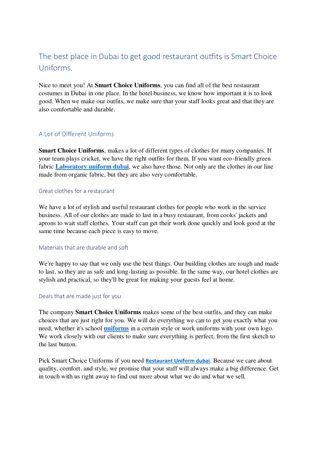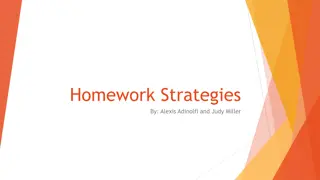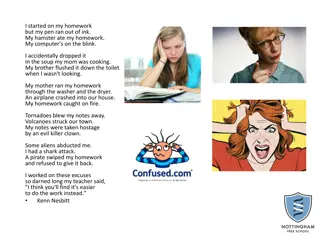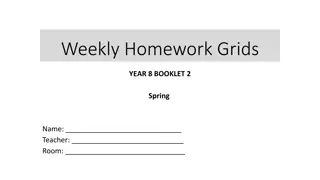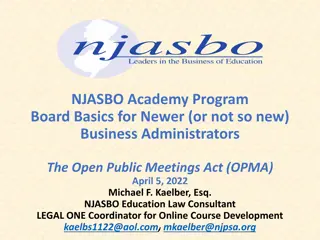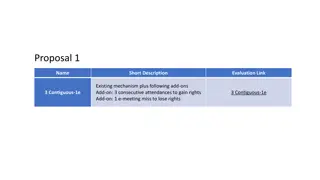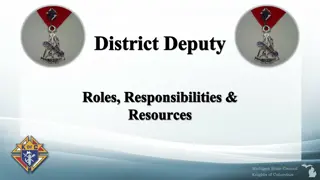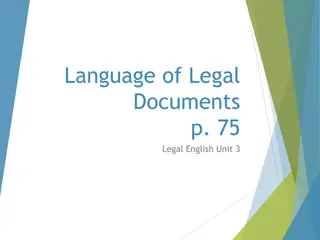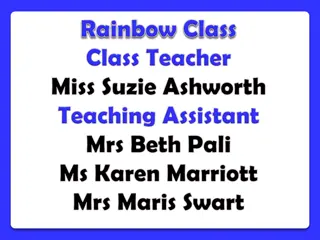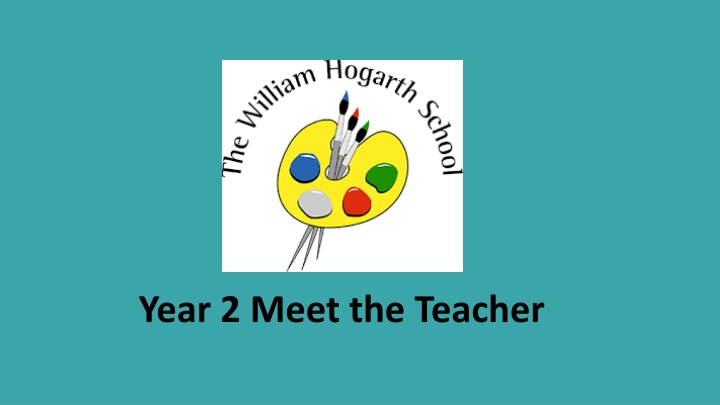
Effective Communication and Home Learning Tips for Year 2 Parents and Carers
Enhance your child's learning experience in Year 2 by staying informed and engaged. Discover key communication strategies with the school, get insights into effective home learning practices, and understand the importance of regular feedback and involvement. Stay connected with the school community for a successful academic journey.
Download Presentation

Please find below an Image/Link to download the presentation.
The content on the website is provided AS IS for your information and personal use only. It may not be sold, licensed, or shared on other websites without obtaining consent from the author. If you encounter any issues during the download, it is possible that the publisher has removed the file from their server.
You are allowed to download the files provided on this website for personal or commercial use, subject to the condition that they are used lawfully. All files are the property of their respective owners.
The content on the website is provided AS IS for your information and personal use only. It may not be sold, licensed, or shared on other websites without obtaining consent from the author.
E N D
Presentation Transcript
Communication Communication The key to a successful working The key to a successful working relationship relationship FAMILIES (PARENTS & CARERS) FAMILIES (PARENTS & CARERS) Check the Calendar of Events regularly Read the newsletter Check the Year Group Noticeboards for half termly curriculum newsletters Attend parent teacher consultations Communicate at the gate at home time with the class teacher Email admin@hogarth.hounslow.sch.uk Website https://www.williamhogarthschool.co.uk Twitter - @hogarth_the School phone - 020 8994 4782 Planners
Home Learning Home Learning set every Thursday on Google set every Thursday on Google Classroom. Must click hand in by the following Classroom. Must click hand in by the following Wednesday. Wednesday. Aims of home learning To give children an opportunity to practice basic skills linked to learning in school. To engage all children in learning in a cross curricular manner. To allow children to shine in all subject areas To generate pride and excitement about what they are producing To be more open ended so children have more flexibility over what they are producing and how Traditional homework is scientifically proven to have very little impact on pupils learning Research says that home learning which has the most impact on learning is practising basic skills through repetition and giving children ownership over what they are doing.
Every Home Learning Home Learning Reading On Mondays children will receive 2 levelled books for the week and on Tuesdays children can change library books. Reading should be recorded in pupil planners Each entry needs: the date, the book being read, how much was read and any comments about how they got on. Pupil Planners should be brought in daily to be checked in class.
Home Learning: posted on Google Classroom Home Learning: posted on Google Classroom SPELLING 10 spelling words will be put on Google Classroom weekly. Research indicates that the best way for children to learn the spelling of more complex words is to use them in the correct context. Spelling test will be once a week. Children have personal log-ins to access vocabulary and spelling activities via the PiXL Vocab App (free download from the App Store, Google Play, Amazon App) and Doodle https://vocab.pixl.org.uk/
Home Learning Home Learning Multiplication Tables National Curriculum expectation: all children know a range of multiplication tables and facts (at least up to 12 x 12) by the end of Year 4. To support this, children will note their Challenge Level weekly in their pupil planners. The practice children complete at home will help to prepare them for a timed test in class. It will also help them substantially with their written methods and mathematical problem solving, as they will be able to focus on their reasoning rather than calculations that need to be known by heart. Mathematics It will be expected for all children to spend 15 minutes on Doodle Maths, three times a week. All children should aim to be in their green zone of learning. Doodle maths is personalised to each child.
Creative home learning tasks all link directly to the topic being studied in class and will support the children s learning by giving them opportunities to learn new knowledge around their topic, explore a particular area of interest in more depth or further develop their skills. A selection of different tasks will be provided and displayed on the Year Group page at the start of each half term. Families and children are encouraged to choose one (or more) of these projects to work on together at home, so that parents and carers can share in and further enrich the learning that is taking place in class. At the end of each half term, parents will be invited to a Celebration of Learning open afternoon to give families an opportunity to celebrate the topic work their children have been completing in class and to see how this links to the projects they have worked on together at home. Home Learning Home Learning Half Termly Creative Home Learning Creative home learning is one of the fundamental principles that underpins our Home Learning Policy and an important way for us to build effective home school partnerships. This is because we believe that learning continues beyond the classroom. Children will be introduced to their new creative topic at the start of each half term.
Home learning that is not being completed Parents are encouraged to talk to their child s class teacher if their child is unable or unwilling to complete home learning tasks independently. We will also offer some after school homework clubs in the school library for parents to support their children in a friendly and hardworking atmosphere. Class teachers will discuss any concerns about home learning tasks initially with children and then parents in order to find out the reasons behind incomplete tasks. Home Learning Home Learning WHOLE SCHOOL HOME LEARNING Sometimes, children are asked to contribute to an activity or concert by learning words to a poem, play or song etc. Learning by heart in these situations helps children develop techniques for learning, contributes to their self-esteem by giving them an opportunity to experience success and participate fully in the activity. It also contributes to the whole school ethos, developing a sense of responsibility for team success. Families and children are encouraged to value this home learning so that it is done alongside any other home learning set by the class teacher.
Home Learning Home Learning Holiday Home Learning We place great value on children having opportunities to spend time with their families, playing, talking and having fun so we will not set homework over school holidays. However, we do expect children to read or be read to every day. Children will also continue to be able to access fun learning activities online or via the Apps. Do you all know how to hand in an assignment on Google Classroom?
School Uniform School Uniform White short or long-sleeved logo d polo shirt Grey logo d V neck cardigan or jumper with double gold stripe Plain grey trousers, shorts, skirt, pinafore or gingham dress (in summer) Plain long or short, grey, black or white socks or tights Sensible black flat shoes or boots (in winter) Black reversable logo d school coat or plain black or navy coat (Winter is coming!) Grey or black scarf, hat and gloves Grey, black or white kippa or turban Grey, black, white or yellow hijab Plain grey, black, white or yellow hair accessories (shoulder length hair tied back) Black logo d rucksack or plain black rucksack
PE Kit PE Kit White logo d sports top with house coloured sleeves Black shorts Black logo d hoodie with black tracksuit bottoms Trainers or plimsolls Water bottles Key Stage 1: PE Kits should be in school every day. They will be sent home half-termly. Key Stage 2: Clean PE Kits should be brought in every Monday.
Assessments Termly assessments in November and March. Children will be taking the phonics screening check in October. Children will be taking KS1 SATs in May. Some information here: https://www.theschoolrun.com/KS1- SATs-in-2021 Curriculum Topics this year Autumn 1 - Land Ahoy Autumn 2 - Street Detectives Spring 1 - Great fire of London Spring 2 Flow Summer 1 Chiswick History Summer 2 Chiswick Geography Trips: Autumn - Local streets of Chiswick Spring Monument Spring River Thames Summer Chiswick House Grounds Curriculum newsletter posted on the website each half term
Time 8.45 9.00 Monday Soft Start Maths Tuesday Soft Start Maths Wednesday Soft Start Maths Thursday Soft Start RE Friday Soft Start Maths 9.45 Story Time Library / Story Time Story Time Art ERIC Story Time 10.15 10.30 Break English Break English Break English Break Singing Break English 11.20 Comprehension Comprehension Comprehension Art Comprehension 11.50 12.00 Daily Mile Lunch Daily Mile Lunch Daily Mile Lunch Daily Mile Lunch Daily Mile Lunch 1.00 1.15 1.30 1.45 2.00 2.15 Oracy Spelling Computing Oracy Spelling Handwriting Oracy Spelling Grammar Oracy Oracy Assembly Times Table Challenge Maths Handwriting PSHE Science Humanities English Grammar 2.45 PE PE 3.15 3.30 Assembly Home time Story Time Home time Home time Home time Home time
Assemblies Harvest assembly Wednesday 22nd September Year 2 Guy Fawkes assembly Friday 5th November Last week before Christmas KS1 nativity performance
Thank you for coming! Any questions?



